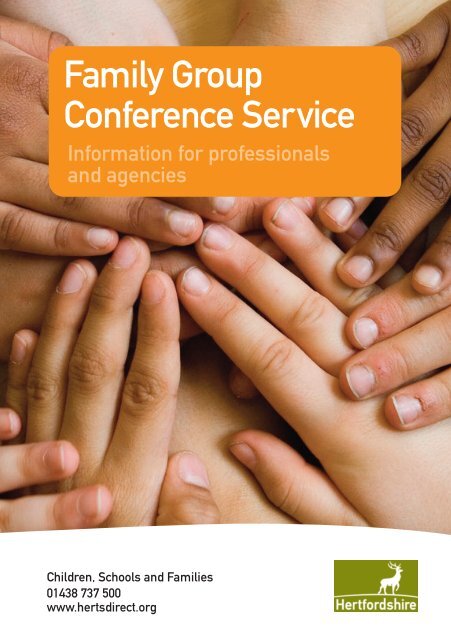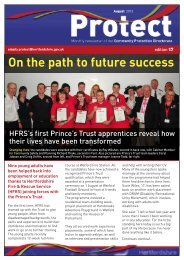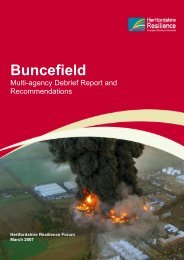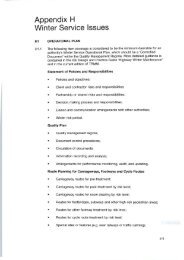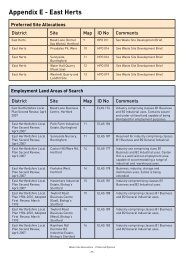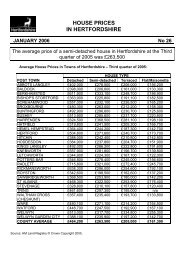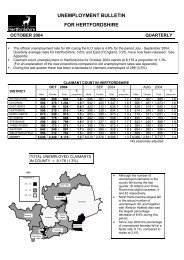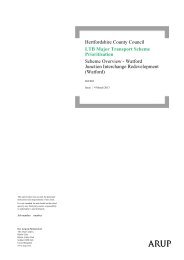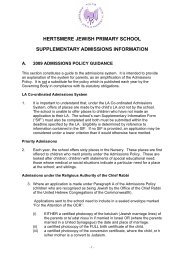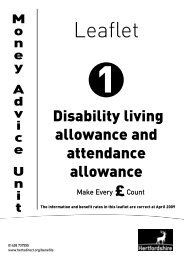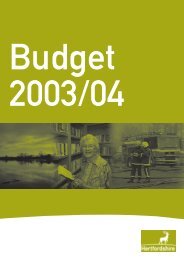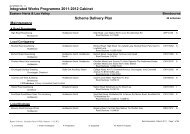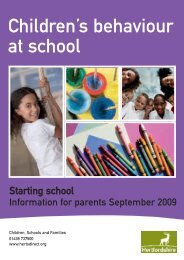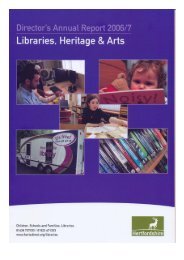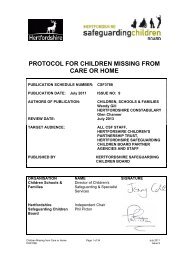Family Group Conference Service - Hertfordshire County Council
Family Group Conference Service - Hertfordshire County Council
Family Group Conference Service - Hertfordshire County Council
You also want an ePaper? Increase the reach of your titles
YUMPU automatically turns print PDFs into web optimized ePapers that Google loves.
<strong>Family</strong> <strong>Group</strong><strong>Conference</strong> <strong>Service</strong>Information for professionalsand agenciesChildren, Schools and Families01438 737 500www.hertsdirect.org
<strong>Family</strong> <strong>Group</strong> <strong>Conference</strong> <strong>Service</strong>2The meeting isarranged andfacilitated byan independentfamily groupconferencecoordinatorWhat is a <strong>Family</strong> <strong>Group</strong> <strong>Conference</strong>?A <strong>Family</strong> <strong>Group</strong> <strong>Conference</strong> (FGC) is a family ledmeeting where family members and their friendscome together to discuss and negotiatesolutions to the difficulties being experienced bythe family in caring for their children.The meeting is arranged and facilitated by anindependent family group conferencecoordinator, who is not involved in makingdecisions about the child/children but supportsthe family to make a plan in the best interests ofthe child/children involved.The meeting is unlike other CSF meetings.It consists of three key stages:1. Information sharingInformation is provided by the CSF referrer,which outlines clearly the concerns of thechild/children. Within this information, thereshould be specific questions that the familyneed to think about and action in their plan,with the support of the extended family and/or friends.2. Private family timeThis is time where the family are left inprivate to discuss and negotiate betweenthemselves how the concerns outlined in theinformation sharing part of the meeting aregoing to be addressed. They make a planand identify actions that need to be taken.3. Agreeing the plan
Information for professionals and agenciesThe final part of the meeting is where theCSF referrer and coordinator rejoin themeeting with the family to clarify and agreethe family’s plan. The plan must be safe, inthe best interest of the child/children andagreed with by all the family.Why should I refer?FGC’s have beenproven, throughresearch, tohelp producebetter outcomesfor childrenFGC’s have been proven, through research, tohelp produce better outcomes for children andyoung people by keeping them within their ownfamily or community network. FGC's are basedon the belief that families understand their ownfamily relationships best and that children andyoung people have the right to family life.Children and young people also have the rightto have their family involved in future planning.Benefits of referring to a FCG can include:● preventing children being taken into LocalAuthority care● encouraging the family to put forward theirown solutions and ideas which can result inmore successful lasting outcomes● providing more realistic solutions that familiesthemselves have decided on, giving a senseof ownership● improving relationships within the familyand professional network3
<strong>Family</strong> <strong>Group</strong> <strong>Conference</strong> <strong>Service</strong>Prior to the FGCmeeting thesocial workerwill ensure thatthe family agreeto have a FGC●●●●offering a greater network of supportservices and interventionspreventing offending, anti-social behaviour,child protection concerns, truancy andexclusionsworking in conjunction with or preventingcourt interventions e.g. Care Orders,Contact Orders or Residence Ordersallowing people to be heard, especially thechild or young person.Social worker’s rolePrior to the FGC meeting the social worker will:● ensure that the family agree to have a FGC● email the completed referral form to theFGC administrator or manager● complete a brief report for the FGC meetingand share this with the family and thecoordinator at least one week beforethe FGC meeting● liaise with the coordinator throughout theprocess, updating them of any changes inthe family circumstances or procedures.4
Information for professionals and agenciesAt the meeting the social worker will:● verbally share the report with the family atthe beginning of the meeting and add anyrelevant updates● respond to any additional questions thefamily may have, including whatresources are available to support the familythat they could consider within their familyplan● return to the family meeting with thecoordinator once the family has agreed aplan, to ensure the plan is safe for the childor young person and to negotiate resources● informing the family within an agreedtimescale about any requests made forresources that cannot be agreed immediately(for example resources requiring funding)● making any reasons for not accepting a planimmediately clear, so that the family are giventhe opportunity to respond to the reason andamend the plan if they wishAt the meetingthe socialworker willverbally sharethe report withthe family andadd any relevantupdatesIt is essential that ALL parties implement andaction their part of the plan within the agreedtimescales. A review meeting is held withinapproximately three months of the originalFGC; the timing of this can be variable, atthe family’s request.5
<strong>Family</strong> <strong>Group</strong> <strong>Conference</strong> <strong>Service</strong>Most importantlythe family mustbe willingto have afamily groupconference.Public Law Outline Court Process.FGCs and review meetings should be carefullyconsidered within any court processes as partof the Public Law outline and held within theappropriate timescales.Who can refer?At present only social workers and professionalassistants can make a referral but healthvisitors, teachers, attendance improvementofficers and other agencies can consult with asocial worker who will then consider making areferral.Referral criteriaMost importantly the family must be willing tohave a family group conference.The service can support children and youngpeople up to the age of 18 in situations where:● there are family difficulties which mayresult in a child or young person becominglooked after● parents cannot care for their child/childrenand the meeting can help to find alternativefamily members to care for the child/childrenor young person● it would help to improve family relationshipsand support difficulties with a child’sbehaviour6
Information for professionals and agencies●●it could assist with contact arrangementsit could help with issues around schoolattendance.How to make a referral?The social worker should complete the FGCreferral form and email it to the Manager of theFGC <strong>Service</strong>. If you would like to know moreabout the FGC <strong>Service</strong> offered in <strong>Hertfordshire</strong>please refer to the FGC <strong>Service</strong> Principles andPractice Guidance.7
<strong>Hertfordshire</strong> <strong>County</strong> <strong>Council</strong> - making <strong>Hertfordshire</strong>an even better place to live by providing:Care for older peopleSupport for schools, pupils and parentsSupport for carersFire and rescueFostering and adoptionSupport for people with disabilitiesLibrariesAdmission to schoolsRoad maintenance and safetyProtection for adults and children at riskTrading standards and consumer protectionHousehold waste recycling centresThese are only some of our services.Find out more at www.hertsdirect.orgor email us at hertsdirect@hertscc.gov.ukEvery <strong>Hertfordshire</strong> library has internet access for the publicCSFPub 0112 Issue 1 March 2009<strong>Hertfordshire</strong> <strong>County</strong> <strong>Council</strong>Children, Schools and Families<strong>County</strong> Hall, Pegs Lane, Hertford, SG13 8DF


